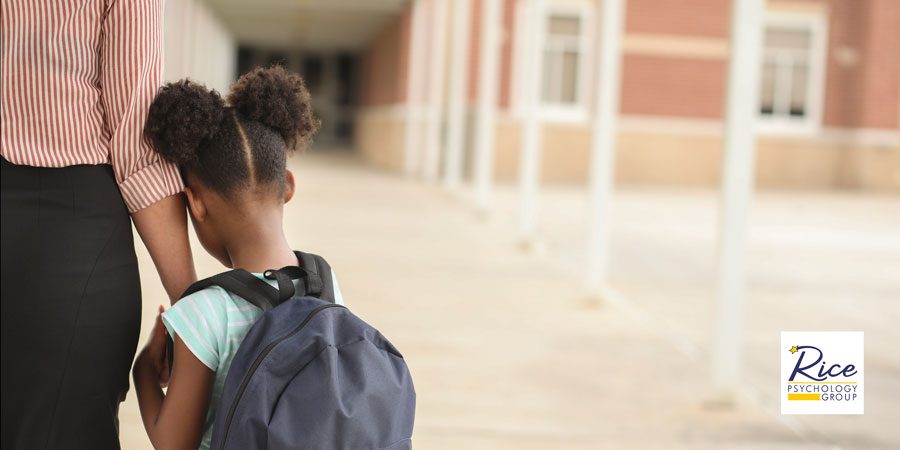
The school year is up and running, the kids are busier, and everyone is working hard to do their best. However, there’s something your kids may be dealing with that can sometimes either go unnoticed or they try to hide.
Social anxiety.
Did you ever freeze up while speaking to the rest of the class when you were a kid? Did lunchtime in the cafeteria freak you out? Did you try to hide when teachers asked for volunteers?
At its mildest, social anxiety can be stressful and exhausting. At its worst, it can keep kids out of school and prevent them from making friends. It’s also one of our specialties at Rice Psychology Group. We want to help your kids learn to manage their anxiety caused by social situations and interactions. Read on to learn more from our licensed psychologists and therapists in Tampa.
Recognizing the Problem
Social anxiety can hinder a child’s academic performance, relationships with friends, and confidence, and even keep them from participating in athletics, band, or clubs. The first thing you can do is try to understand the problem because social anxiety isn’t just a fear of talking to other people and it’s not just feeling shy. It can happen simply by having to read out loud or even walking through a crowded cafeteria. A child’s fear is that they may or will be judged/scrutinized by others.
The next step is recognizing the signs that a child may be suffering from social anxiety:
- High levels of fear over small events like simple get-togethers.
- Dreading social situations that are weeks away or may not even happen.
- Excessively clinging to familiar people.
- Throwing fits in anticipation of interacting socially.
- Blaming others for what they think are social shortcomings/blunders.
- Physical symptoms like a shaky voice, trembling, nausea, and trouble speaking.
Getting on the Right Track
In many cases, children don’t know why they feel the way they do, so it’s up to you to help them understand their fears. Guiding them towards identifying the triggers to their reactions is a good start. Once you’ve done that, you can introduce a few techniques that will help them relax, change their outlook, and move forward.
Teach Them About Anxiety
Let them know that just because they feel anxious or worried about social situations doesn’t mean those situations pose any danger, that bad things will definitely happen, or that they can’t get through those moments. Teach them to talk back to the worried voice in their head and do the opposite of what their anxiety is telling them to do.
For example, if anxiety is telling them that they will mess up if they raise their hand to answer a question in class, have them practice doing this at home. You can also set up a pre-planned question with their teacher that they can answer in school when they are ready.
Find a Way to Relax
When we panic, we can’t perform well or think straight, so try to help your child relax when they start panicking. One way to do this is by teaching them to take deep breaths to relax their muscles. You can do this together so they feel more comfortable. They can also get up and move around a bit or have a drink or water.
Give it a Number
On a scale of 1 to 10, have them rate their anxiety. This teaches kids that all situations are likely not equally anxiety-provoking, and some may be more doable than others.
Play the Reframe Game
When faced with anxiety, we tend to think of worst-case scenarios for each possible social interaction. Help your child turn this frame of thought around. If they think they’re “dumb” because they couldn’t hold a conversation with friends or classmates, it’s possible they were trying to talk about something that didn’t interest them.
So, rather than thinking they are “dumb” at conversing, they can reframe that thought to, “I can talk about things I know about and can get better with topics that I don’t.” Practice conversation skills about topics of interest and then encourage them to try to talk with a peer about a subject that they find interesting like music, movies, or animals.
Face it and Find a Solution
Anxiety often keeps us from facing our problems. Practicing different social scenarios is a great way to deal with these problems in a safe setting. For example, if your child has issues with group interactions, help them practice social skills like greetings, eye contact, listening, and responding. Just make sure to keep it fun and light so they don’t overthink these interactions.
Our Licensed Therapists in Tampa
Research has shown that, while medication can help those with social anxiety within four to six weeks, cognitive behavioral therapy teaches skills to manage all kinds of anxiety, and the benefits can last a lifetime.
At Rice Psychology Group, we understand that school can be difficult to get through. If that’s the case for your child, know that our Tampa psychologists and therapists are here to help. We’ll listen to what you and your child have to say in a comfortable and safe environment. Together, we’ll find a solution. Reach out to us in Tampa today to learn more or to schedule an appointment.

